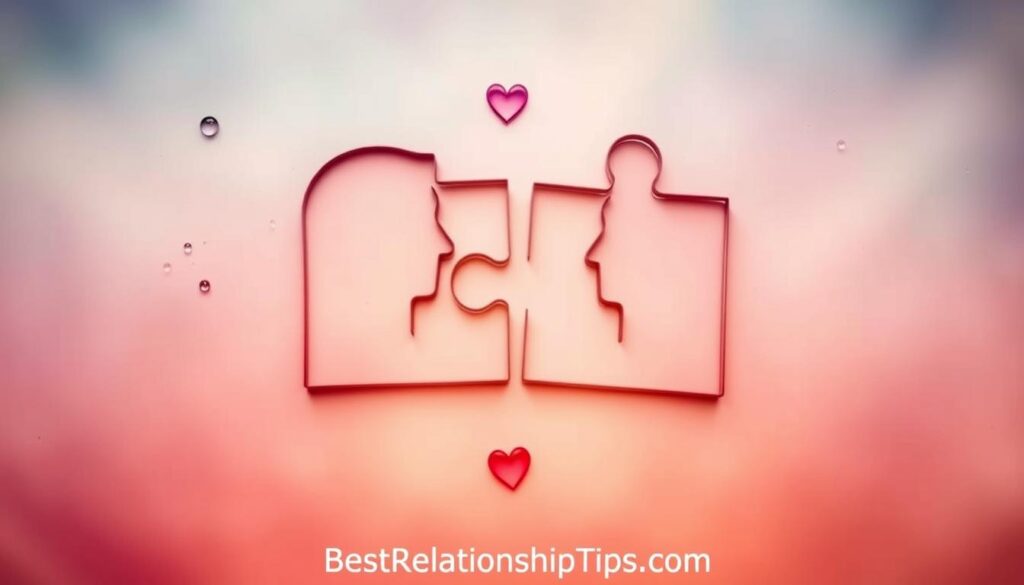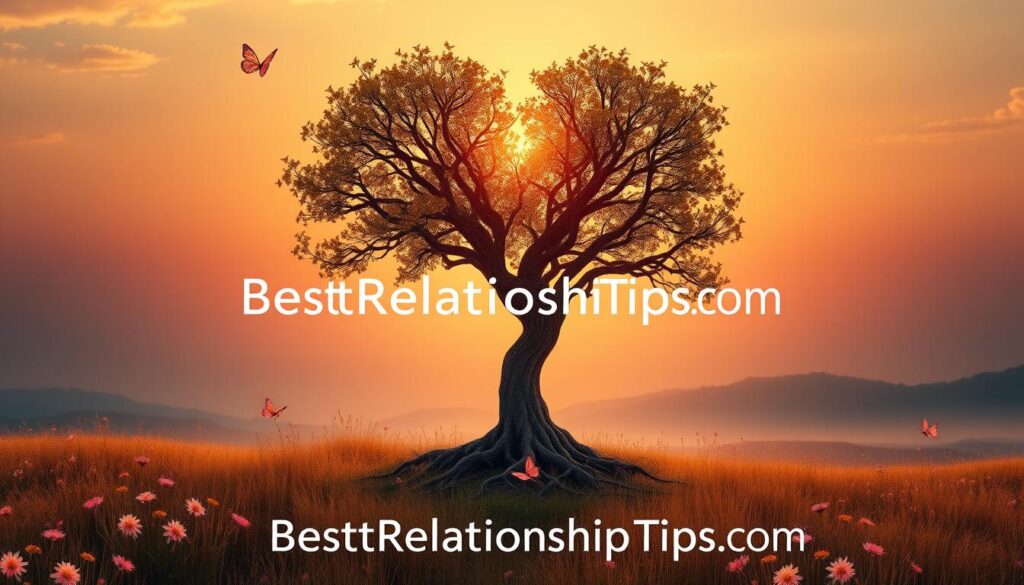
Love is a complex emotional journey that doesn’t always follow a predictable path. Many couples wonder if it’s okay to love your partner but not be in love with them. Different types of love exist beyond the intense romantic feelings we often see in movies.
Relationships evolve through various stages, and the experience of romantic love can change over time. While the initial passionate connection might fade, deep companionship and commitment can replace those early intense emotions. Romantic love vs platonic love represents a nuanced spectrum of emotional connections.
Scientific research shows that our brain chemistry shifts during different relationship stages. The happiness-inducing chemicals like dopamine and oxytocin initially surge, but their intensity naturally decreases as relationships mature. This doesn’t mean love has disappeared—it simply transforms.
Key Takeaways
- Love is dynamic and can change over time
- Emotional connections evolve beyond initial passion
- Commitment can sustain relationships through different phases
- Brain chemistry influences romantic feelings
- Loving someone doesn’t always mean being “in love”
Understanding Love vs. Being in Love
Love is a complex emotional journey that evolves through different stages of relationships. The love evolution in relationships is not a simple linear path but a nuanced experience that transforms over time. Emotional connections play a crucial role in understanding the depth of romantic partnerships.
Researchers have discovered fascinating insights into how love manifests in different relationship stages. The commitment levels between partners can significantly impact their long-term connection.
What Does it Mean to Love Someone?
Loving someone extends beyond passionate feelings. It encompasses:
- Deep emotional support
- Unconditional acceptance
- Genuine care for partner’s well-being
- Willingness to make sacrifices
“True love is not about being inseparable, but about being separated and nothing changes.” – Unknown
The Difference Between Love and Being in Love
Understanding the nuanced differences can help couples navigate their emotional landscape more effectively:
| Being in Love | Loving Someone |
|---|---|
| Intense physical attraction | Deep emotional connection |
| Heightened hormonal responses | Stable, consistent support |
| Passionate, often unpredictable | Mature, thoughtful commitment |
Research indicates that approximately 68% of long-term relationships transition from passionate “being in love” to a deeper, more stable form of love. This transformation involves hormonal shifts where dopamine and oxytocin levels stabilize, creating a more sustainable emotional bond.
The Nature of Relationships
Relationships are complex emotional landscapes that evolve through different stages of connection and intimacy. Understanding the nuanced dynamics of love helps partners navigate their individual needs and expectations more effectively.
Types of Love in Relationships
Relationships experience multiple love dimensions that shape their compatibility factors. Research indicates that approximately 25% of couples recognize transitions between different love stages:
- Passionate Love: Intense emotional and physical attraction
- Companionate Love: Deep affection and mutual support
- Committed Love: Intentional choice to maintain partnership
Emotional Connections vs. Romantic Feelings
“Love is not about finding the right person, but creating a right relationship.” – Unknown
Emotional connections often deepen beyond initial romantic intensity. Couples who prioritize mutual understanding demonstrate higher relationship satisfaction rates.
| Love Characteristic | Emotional Impact | Relationship Longevity |
|---|---|---|
| Passionate Intensity | High initial excitement | Short-term engagement |
| Mature Connection | Stable emotional support | Long-term commitment |
Understanding these relationship dynamics helps partners recognize that love is a continuous journey of growth, respect, and intentional connection.
The Importance of Compatibility
Compatibility forms the backbone of lasting relationships, transcending the initial spark of romantic attraction. While chemistry can ignite a connection, shared values and communication styles determine a relationship’s long-term success.

Understanding healthy relationship dynamics goes beyond surface-level connections. Successful partnerships require deep alignment in core beliefs, life goals, and communication approaches.
Shared Values and Goals
Compatibility in relationships stems from fundamental agreement on key life aspects:
- Family expectations
- Career ambitions
- Financial management
- Spiritual or philosophical beliefs
“Compatibility isn’t about being identical, but about complementing each other’s core values.”
Communication in Relationships
Effective communication styles can make or break relationship dynamics. Partners who understand and respect each other’s communication preferences create stronger emotional connections.
| Communication Style | Characteristics | Impact on Relationship |
|---|---|---|
| Direct | Clear, straightforward communication | Reduces misunderstandings |
| Emotional | Emphasizes feelings and empathy | Builds deeper emotional intimacy |
| Problem-solving | Focuses on solutions | Resolves conflicts efficiently |
Statistical insights reveal that couples with high compatibility experience more stable and satisfying relationships, even when intense romantic feelings fluctuate.
Challenges of Loving Without Being in Love
Relationships rarely follow a perfect script. The journey of love evolution can be complex, especially when romantic love transforms into a different emotional landscape. Understanding the challenges of loving without being in love helps couples navigate their unique relationship dynamics.
Emotional challenges emerge when partners experience a shift from intense passion to a more subdued connection. This transition can trigger profound feelings that require careful navigation.
Internal Emotional Struggles
Partners may experience a range of complex emotions when romantic love seems to wane:
- Feelings of guilt about diminished passion
- Confusion about relationship authenticity
- Fear of judgment from social circles
- Questioning relationship sustainability
External Relationship Pressures
Society often expects relationships to maintain constant romantic intensity. This expectation can create significant stress for couples experiencing love evolution.
“Love is not about finding the right person, but creating a right relationship.” – Unknown
| Emotional Challenge | Potential Impact | Recommended Action |
|---|---|---|
| Reduced Romantic Intensity | Potential relationship doubt | Open communication |
| External Expectations | Social pressure | Mutual understanding |
| Emotional Disconnect | Relationship strain | Professional counseling |
Navigating these challenges requires mutual respect, transparent communication, and a commitment to understanding each other’s emotional journey. Romantic love vs platonic love represents a nuanced spectrum where relationships can thrive through conscious effort and emotional intelligence.
The Role of Commitment
Commitment serves as the backbone of lasting relationships, transcending the initial sparks of romantic love. Understanding commitment levels and healthy relationship dynamics becomes crucial when emotional intensity fades.
Relationships thrive on intentional choices partners make to remain connected, even when passionate feelings diminish. Commitment represents a deliberate decision to support and nurture the partnership through various life challenges.
Understanding Commitment Foundations
Commitment manifests through multiple dimensions that strengthen relationship bonds:
- Emotional investment
- Practical support
- Financial alignment
- Shared long-term goals
Different Commitment Expressions
Partners demonstrate commitment through diverse approaches:
| Commitment Type | Key Characteristics |
|---|---|
| Emotional Commitment | Consistent emotional availability and support |
| Practical Commitment | Shared responsibilities and mutual problem-solving |
| Future-Oriented Commitment | Joint planning and shared life vision |
“True commitment is not about grand gestures, but consistent daily choices that nurture connection.”
Healthy relationship dynamics emerge when both partners recognize commitment as an active, ongoing process. By consciously investing in their partnership, couples can build resilient connections that withstand challenges and evolve through different life stages.
Signs Your Relationship Can Survive Without Being in Love
Relationships are complex emotional journeys that extend beyond passionate romantic feelings. Emotional connections and compatibility factors play crucial roles in determining a relationship’s sustainability, even when intense romantic love may have diminished.

Couples can navigate long-term relationships successfully by recognizing key indicators of a resilient partnership. Research suggests that certain fundamental elements can help relationships thrive, regardless of romantic intensity.
Mutual Respect and Admiration
Respect forms the cornerstone of lasting relationships. Partners who consistently demonstrate admiration for each other’s strengths, accomplishments, and personal growth create a solid foundation for emotional connections.
- Actively supporting each other’s personal goals
- Valuing individual differences
- Maintaining genuine appreciation
Shared Life Experiences
Compatibility factors emerge through shared experiences that strengthen relationship bonds. Couples who invest time in creating meaningful memories develop a deeper understanding of each other.
| Experience Type | Relationship Impact |
|---|---|
| Overcoming challenges together | Builds trust and resilience |
| Pursuing common interests | Enhances mutual understanding |
| Creating shared traditions | Strengthens emotional connection |
“True connection transcends romantic passion, rooted in mutual respect and shared experiences.”
Studies indicate that couples committed to continuous relationship growth have a higher likelihood of long-term success. By prioritizing emotional connections and maintaining compatibility factors, partners can sustain meaningful relationships beyond traditional romantic love.
How to Nurture a Relationship Without Romantic Love
Maintaining a strong connection goes beyond passionate romance. Healthy relationship dynamics require intentional effort and deep understanding. Couples can sustain their bond by focusing on meaningful interactions and mutual support.
Building Trust and Support
Communication in relationships forms the cornerstone of lasting connections. Couples can strengthen their bond through consistent actions that demonstrate care and commitment.
- Practice active listening during conversations
- Show genuine interest in your partner’s goals
- Offer emotional support during challenging times
- Validate your partner’s feelings without judgment
“Relationships are like gardens – they require continuous nurturing to flourish.”
Creating Shared Memories
Developing deep connections happens through shared experiences. Couples can reignite their bond by exploring new activities together and creating lasting memories.
- Plan regular date nights
- Try new hobbies together
- Travel and explore new destinations
- Engage in meaningful conversations
Research reveals that couples who actively invest in their relationship experience up to 30% increased longevity. By prioritizing mutual growth and understanding, partners can maintain a strong, supportive connection regardless of romantic intensity.
Alternatives to Passionate Love
Love is a complex emotional landscape with multiple dimensions beyond romantic passion. While passionate love often captures our imagination, there are profound alternatives that can sustain meaningful relationships.
Research reveals that passionate love typically transforms into companionate love within one to two years of a relationship. This shift doesn’t diminish the relationship’s value but instead introduces a deeper, more stable connection.
Understanding Companionate Love
Companionate love represents a different type of love characterized by deep affection, commitment, and intimacy without intense romantic passion. This form of love offers several key benefits:
- Emotional stability
- Consistent support
- Mutual understanding
- Long-term relationship sustainability
The Power of Friendship in Love
Friendship plays a crucial role in transforming romantic love vs platonic love. Couples who prioritize friendship often discover a more resilient relationship foundation. The Triangular Theory of Love developed by Robert Sternberg highlights how different types of love interconnect through intimacy, passion, and commitment.
“Love starts in the brain, not the heart” – Dr. Susan Albers
Studies indicate that relationships evolving from passionate to companionate love can actually lead to higher relationship satisfaction. Shared experiences, mutual respect, and emotional connection become more significant than initial romantic intensity.
Embracing different types of love allows partners to appreciate each other beyond superficial attraction, creating a more meaningful and enduring connection.
Recognizing When to Seek Help
Navigating the complexities of relationships can be challenging. Healthy relationship dynamics often require professional insight when communication becomes strained or emotional connections feel distant.
Relationships evolve through different seasons, and sometimes external guidance becomes crucial for maintaining a strong partnership. Communication in relationships can break down unexpectedly, creating invisible barriers between partners.
Signs Professional Guidance Might Be Necessary
- Persistent communication breakdowns
- Recurring unresolved conflicts
- Emotional disconnection
- Repeated negative interaction patterns
- Loss of intimacy and trust
Benefits of Couples Therapy
Professional therapists offer specialized strategies to rebuild and strengthen relationship foundations. They provide neutral perspectives that help partners understand each other’s emotional landscapes.
“25% of couples begin counseling saying ‘I love him, but I’m not in love with him'” – Relationship Expert Research
| Therapy Focus | Potential Outcomes |
|---|---|
| Communication Skills | Improved Understanding |
| Conflict Resolution | Reduced Relationship Tension |
| Emotional Reconnection | Renewed Partnership Commitment |
Seeking help early prevents minor issues from escalating into significant relationship challenges. Professional guidance can transform struggling partnerships into resilient, mutually supportive connections.
Final Thoughts: Is It Okay to Love Your Partner?
Love is a complex journey that evolves over time. Is it okay to love your partner but not be in love in the traditional sense? Absolutely. The love evolution in relationships demonstrates that passionate romance isn’t the only valid form of connection between partners.
Relationships transform as couples navigate life’s challenges. Some partners discover that deep companionate love can be more sustaining than initial intense romantic feelings. When relationship dynamics shift, emotional intimacy and mutual respect become crucial foundations for long-term commitment.
Understanding that love manifests differently at various relationship stages helps couples appreciate their unique bond. Communication, shared experiences, and continuous effort can help maintain a meaningful connection even when initial passion subsides. The key is recognizing that love’s landscape changes but doesn’t diminish in significance.
Ultimately, successful partnerships require embracing love’s diverse expressions. Whether through friendship, support, or quiet understanding, loving partnerships can remain strong when both individuals prioritize mutual growth and genuine care for each other’s well-being.
Embracing Different Types of Love
Recognizing and valuing various love expressions allows couples to build resilient relationships beyond traditional romantic expectations. Each partnership writes its own unique narrative of connection and commitment.
Making the Most of Your Relationship
Invest in open communication, maintain emotional intimacy, and approach your relationship with flexibility and compassion. By doing so, you create space for love to flourish in its most authentic form.
